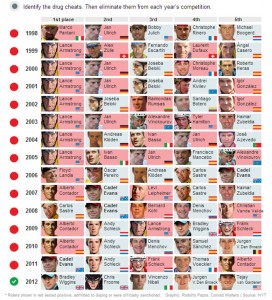As a keen cyclist and long time follower of Le Tour de France, like many others I was disappointed with Lance Armstong‘s doping scandal after all that he has done to boost the profile of cycling in English speaking countries around the world. The Age published a telling chart of the top place getters in the Tour for the last few decade or so, highlighting those who had been implicated in doping at some point. This diagram left only Cadel Evans, Andy Schleck, Carlos Sastre and a few others clear.
Apart from the downright arrogance of competing and winning while doping, standing on the podium, accepting praise and financial rewards etc., I find one of the most irritating aspects of cheats riding Le Tour is the effect they had on other riders in the race that cannot be undone by ‘moving everyone up a place’. To explain, in a three week competition, having cheats in each stage, performing at levels not naturally permitted interrupts how the race plays out and puts non-dopers at greater disadvantage. I believe riders such as Evans and Schleck would have had very different tours if they had not had to chase down the attacks of doping riders, or attempted back to back efforts each day that athletes cannot perform without the help of doping. The wins of a rider can be stripped away in hindsight, but their impact on a race played out over three weeks cannot.
To get to the management implications of this (Congrats if you’re still with me!), I am curious to what extent having competition around us prompts us to excel. Some runners enjoy having a pace setter for certain laps of an athletics race but when the bar is set by those who are not rightfully there or are not performing the same task, perhaps it is damaging. Productivity targets set by those who do not perform the tasks themselves, or targets created by extrapolating the results from one day to a whole month for example, create the same unnatural field for competition.
I believe that ‘what gets measured, gets done’, but I wonder if competition might be another angle for looking at how employees choose where to exert effort.
